#Anyway... Mizu is just Mizu
Text
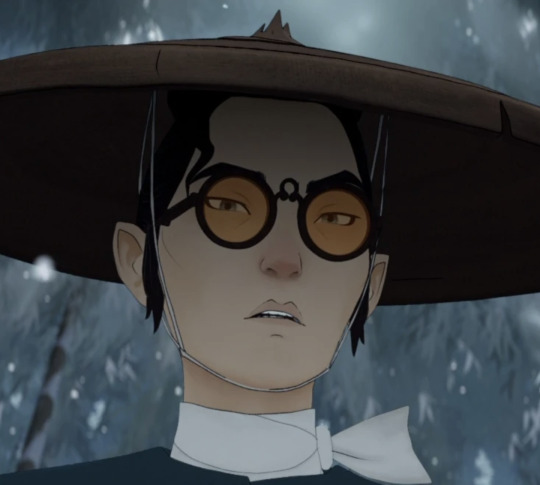
I watched all eight episodes of season 1 of Blue Eye Samurai over the weekend. I then went browsing because I wanted to read some online reviews of the show to see what people were thinking of it and also because I wanted to interact with gifs and art, as the series is visually stunning.
Yet, in my search for opinions on the show, I came across several points I'd like to address in my own words:
Mizu’s history and identity are revealed piece-by-piece and the “peaches” scene with Mizu and Ringo at the lake is intended to be a major character reveal. I think it’s weird that some viewers got angry over other viewers intentionally not gendering Mizu until that reveal, rather than immediately jumping to gender the character as the other characters in the show do. The creators intentionally left Mizu’s gender and sexuality ambiguous (and quite literally wrote in lines to lead audiences to question both) to challenge the viewer’s gut assumption that this lone wolf samurai is a man. That intentional ambiguity will lead to wide and ambiguous interpretations of where Mizu fits in, if Mizu fits in at all. But don't just take my word for this:
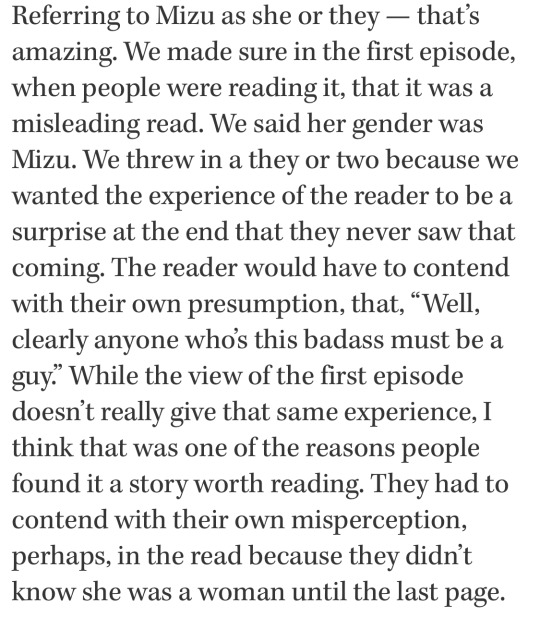
Re: above. I also think it’s weird that some viewers got upset over other viewers continuing to acknowledge that Mizu has a very complicated relationship with her gender, even after that reveal. Canonically, she has a very complicated relationship with her identity. The character is intended to represent liminality in identity, where she’s often between identities in a world of forced binaries that aren’t (widely) socially recognized as binaries. But, again, don’t just take my word for this:
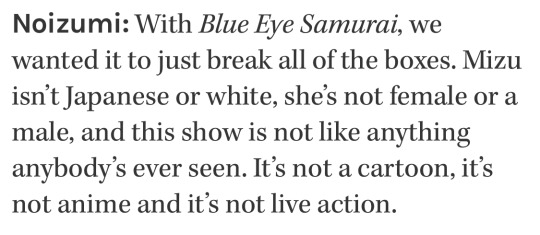
Mizu is both white and Japanese, but she is also not white and not Japanese simultaneously (too white to be Japanese and too Japanese to be white). She’s a woman and a man. She’s a man who’s a woman. She’s also a woman who’s not a woman (yet also not quite a man). But she’s also a woman; the creators said so. Mizu was raised as a boy and grew into a man, yet she was born a girl, and boyhood was imposed upon her. She’s a woman when she’s a man, a man when she’s a man, and a woman when she’s a woman.
Additionally, Mizu straddles the line between human and demon. She’s a human in the sense she’s mortal but a demon in the sense she’s not. She's human yet otherworldly. She's fallible yet greatness. She's both the ronin and the bride, the samurai and the onryō. In short, it’s complicated, and that’s the point. Ignoring that ignores a large part of her internal character struggle and development.
Mizu is intended to represent an “other,” someone who stands outside her society in every way and goes to lengths to hide this “otherness” to get by. Gender is a mask; a tool. She either hides behind a wide-brimmed hat, glasses, and laconic anger, or she hides behind makeup, her dress, and a frown. She fits in nowhere, no matter the identity she assumes. Mizu lives in a very different time period within a very different sociocultural & political system where the concept of gender and the language surrounding it is unlike what we are familiar with in our every-day lives. But, again, don’t just take my word for this:
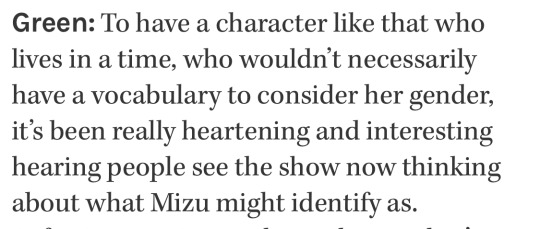
It’s also weird that some viewers have gotten upset over the fact women and queer people (and especially queer women) see themselves in Mizu. Given her complicated relationship with identity under the patriarchy and colonial violence, I think Mizu is a great character for cis-het women and queer folks alike to relate to. Her character is also great for how she breaks the mold on the role of a biracial character in narratives about identity (she’s not some great bridge who will unite everyone). It does not hurt anyone that gender-fluid and nonbinary people see themselves in Mizu's identity and struggle with identity. It does not hurt anyone that lesbians see themselves in the way Mizu expresses her gender. It does not hurt anyone that trans men see themselves in Mizu's relationship with manhood or that trans women can see themselves in Mizu when Mama forces her to be a boy. It's also really cool that cis-het women see themselves in Mizu's struggles to find herself. Those upset over these things are missing critical aspects of Mizu's character and are no different from the other characters in the story. The only time Mizu is herself is when she’s just Mizu (“…her gender was Mizu”), and many of the other characters are unwilling to accept "just Mizu." Accepting her means accepting the complicatedness of her gender.
Being a woman under the patriarchy is complicated and gives women a complicated relationship with their gender and identity. It is dangerous to be a woman. Women face violence for being women. Being someone who challenges sex-prescribed norms and roles under patriarchy also gives someone a complicated relationship with their identity. It is dangerous to usurp gender norms and roles (then combine that with being a woman...). People who challenge the strict boxes they're assigned face violence for existing, too. Being a racial or ethnic minority in a racially homogeneous political system additionally gives someone a complicated relationship with their identity. It is dangerous to be an ethnic minority when the political system is reproduced on your exclusion and otherness. They, too, face violence for the circumstances of their birth. All of these things are true. None of them take away from the other.
Mizu is young-- in her early 20s-- and she has been hurt in deeply affecting ways. She's angry because she's been hurt in so many different ways. She's been hurt by gender violence, like "mama's" misogyny and the situation of her birth (her mother's rape and her near murder as a child), not to mention the violent and dehumanizing treatment of the women around her. She's been hurt by racial violence, like the way she has been tormented and abused since childhood for the way she looks (with people twice trying to kill her for this before adulthood). She's been hurt by state-sanctioned violence as she faces off against the opium, flesh, and black market traders working with white men in contravention of the Shogun's very policies, yet with sanction from the Shogun. She's been hurt by colonial violence, like the circumstances of her birth and the flood of human trafficking and weapons and drug trafficking in her country. She's had men break her bones and knock her down before, but only Fowler sexually differentiated her based on bone density and fracture.
Mizu also straddles the line between victim and murderer.
It seems like Mizu finding her 'feminine' and coming to terms with her 'female side' may be a part of her future character development. Women who feel caged by modern patriarchal systems and alienated from their bodies due to the patriarchy will see themselves in Mizu. They understand a desire for freedom that the narrow archetypes of the patriarchy do not afford them as women, and they see their anger and their desire for freedom in Mizu. This, especially considering that Mizu's development was driven by one of the creators' own experiences with womanhood:
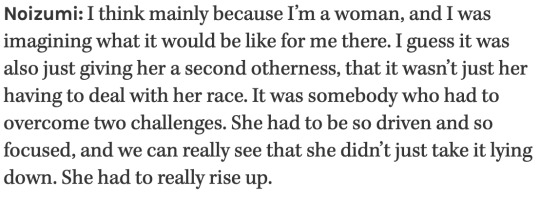
No, Mizu does not pass as a man because she "hates women" or because she hates herself as a woman or being a woman. There are actual on-screen depictions of Mizu's misogyny, like her interactions with Akemi, and dressing like a man is not an instance of this. Mizu shows no discomfort with being a woman or being seen as a woman, especially when she intends to pass herself as and present as a woman. Mizu also shows the women in the series more grace and consideration than any man in the show, in whatever capacity available to her socially and politically, without revealing herself; many of the women have remarked that she is quite unlike other men, and she's okay with that, too.
When she lives on the farm with Mama and Mikio, Mizu shows no discomfort once she acclimates to the new life. But people take this as conclusive evidence of the "only time" she was happy. She was not. This life was also a dance, a performance. The story of her being both the ronin and the onryō revealed to the audience that this lifestyle also requires her to wear a mask and dance, just as the bride does. This mask is makeup, a wedding dress, and submission, and this performance is her gender as a wife. She still understands that she cannot fully be herself and only begins to express happiness and shed her reservation when she believes she is finally safe to be herself. Only to be betrayed. Being a man is her safety, and it is familiar. Being a boy protected her from the white men as a child, and it might protect her heart now.
Mizu shows no discomfort with being known as a woman, except when it potentially threatens her goals (see Ringo and the "peaches" scene). She also shows no discomfort with being known as, seen as, or referred to as a man. As an adult, she seems okay- even familiar- with people assuming she's a man and placing her into the role of a man. Yet, being born a girl who has boyhood violently imposed upon her (she did not choose what mama did to her) is also an incredibly important part of her lived experience. Being forced into boyhood, but growing into a man anyway became part of who she is. But, being a man isn’t just a part of who she became; it’s also expedient for her goals because men and women are ontologically different in her world and the system she lives under.
She's both because she's neither, because- ontologically- she fits nowhere. When other characters point out how "unlike" a man she is, she just shrugs it off, but not in a "well, yeah, because I'm NOT a man" sort of way, but in an "I'm unlike anyone, period," sort of way. She also does not seem offended by Madam Kaji saying that Mizu’s more man than any who have walked through her door.
(Mizu doesn’t even see herself as human, let alone a woman, as so defined by her society. And knowing that creators have stated her future arc is about coming into her “feminine era” or energy, I am actually scared that this show might fall into the trope of “domesticating”/“taming” the independent woman, complete with an allegory that her anger and lack of human-ness [in Mizu’s mind] is a result of a woman having too much “masculine energy” or being masculine in contravention of womanness.)
Some also seem to forget that once Mama and Mikio are dead, no one knows who she is or where she came from. They do not have her background, and they do not know about the bounty on her (who levied the bounty and why has not yet been explained). After their deaths, she could have gone free and started anew somehow. But in that moment, she chose to go back to life as a man and chose to pursue revenge for the circumstances of her birth. Going forward, this identity is no longer imposed upon her by Mama, or a result of erroneous conclusions from local kids and Master Eiji; it was because she wanted people to see her as a man and she was familiar with navigating her world, and thus her future, as a man. And it was because she was angry, too, and only men can act on their anger.
I do think it important to note that Mizu really began to allow herself to be vulnerable and open as a woman, until she was betrayed. The question I've been rattling around is: is this because she began to feel safe for the first time in her life, or is this part of how she sees women ontologically? Because she immediately returns to being a man and emotionally hard following her betrayal. But, she does seem willing to confide in Master Eiji, seek his advice, and convey her anxieties to him.
Being a man also confines Mizu to strict social boxes, and passing herself as a man is also dangerous.
Mizu doesn't suddenly get to do everything and anything she wants because she passes as a man. She has to consider her safety and the danger of her sex being "found out." She must also consider what will draw unnecessary attention to her and distract her from her goals. Many viewers, for example, were indignant that she did not offer to chaperone the mother and daughter and, instead, left them to the cold, only to drop some money at their feet later. The indignity fails consider that while she could bribe herself inside while passing as a man, she could not bribe in two strangers. Mizu is a strange man to that woman and does not necessarily have the social position to advocate for the mother and daughter. She also must consider that causing small social stirs would distract from her goals and draw certain attention to her. Mizu is also on a dangerous and violent quest.
Edo Japan was governed by strict class, age, and gender rules. Those rules applied to men as well as women. Mizu is still expected to act within these strict rules when she's a man. Being a man might allow her to pursue revenge, but she's still expected to put herself forward as a man, and that means following all the specific rules that apply to her class as a samurai, an artisan (or artist), and a man. That wide-brimmed hat, those orange-tinted glasses, and her laconic tendencies are also part of a performance. Being a boy is the first mask she wore and dance she performed, and she was originally (and tragically) forced into it.
Challenging the normative identities of her society does not guarantee her safety. She has limitations because of her "otherness," and the transgression of sex-prescribed roles has often landed people in hot water as opposed to saving them from boiling. Mizu is passing herself off as a man every day of her life at great risk to her. If her sex is "found out" on a larger scale, society won’t resort to or just start treating her as a woman. There are far worse fates than being perceived as a woman, and hers would not simply be a tsk-tsk, slap on the wrist; now you have to wear makeup. Let's not treat being a woman-- even with all the pressures, standards, fears, and risks that come with existing as a woman-- as the worst consequence for being ‘found out’ for transgressing normative identity.
The violence Mizu would face upon being "found out" won’t only be a consequence of being a "girl." Consider not just the fact she is female and “cross-dressing” (outside of theater), but also that she is a racial minority.
I also feel like many cis-het people either ignore or just cannot see the queerness in challenging gender roles (and thus also in stories that revolve around a subversion of sex-prescribed gender). They may not know how queerness-- or "otherness"-- leads to challenging strict social stratifications and binaries nor how challenging them is seen by the larger society as queer ("strange," "suspicious," "unconventional," even "dishonorable," and "fraudulent"), even when "queerness" (as in LGBTQ+) was not yet a concept as we understand it today.
Gender and sexuality- and the language we use to communicate who we are- varies greatly across time and culture. Edo Japan was governed by strict rules on what hairstyles, clothes, and weapons could be worn by which gender, age, and social group, and this was often enshrined in law. There were specific rules about who could have sex with whom and how. These values and rules were distinctly Japanese and would not incorporate Western influences until the late 1800s. Class was one of the most consequential features to define a person's fate in feudal Japan, and gender was quite stratified. This does not mean it's inappropriate for genderqueer people to see themselves in Mizu, nor does this mean that gender-variant identities didn’t exist in Edo Japan.
People in the past did not use the same language we do today to refer to themselves. Example: Alexander The Great did not call himself a "bisexual." We all understand this. However, there is a very weird trend of people using these differences in language and cultures across time to deny aspects of a historical person's life that societies today consider taboo, whether these aspects were considered taboo during that historical time period or not. Same example: people on Twitter complaining that Netflix "made" Alexander The Great "gay," and after people push back and point out that the man did, in fact, love and fuck men, hitting back with "homosexuality wasn't even a word back then" or "modern identity didn't exist back then." Sure, that word did not exist in 300s BCE Macedonia, but that doesn't mean the man didn't love men, nor does that mean that we can't recognize that he'd be considered "queer" by today's standards and language.
Genderqueer, as a word and as the concept is understood today, did not exist in feudal Japan, but the people did and feudal Japan had its own terms and concepts that referred to gender variance. But while the show takes place in Edo Japan, it is a modern adult animation series made by a French studio and two Americans (nationality). Mizu is additionally a fictional character, not a historical figure. She was not created in a vacuum. She was created in the 21st century and co-written by a man who got his start writing for Sex in the City and hails from a country that is in the midst of a giant moral panic about genderqueer/gender-variant people and gender non-conforming people.
This series was created by two Americans (nationality) for an American company. In some parts of that country, there are laws on the book strictly defining the bounds of men and women and dictating what clothes men and women could be prosecuted for wearing. Changes in language and identity over time mean that we can recognize that if Mizu lived in modern Texas, the law would consider her a drag performer, and modern political movements in the show creators' home country would include her under the queer umbrella.
So, yeah, there will also be genderqueer people who see themselves in Mizu, and there will be genderqueer fans who are firm about Mizu being queer to them and in their “headcanons.” The scene setting being Edo Japan, does not negate the modern ideas that influence the show. "Nonbinary didn't exist in Edo Japan" completely ignores that this show was created to explore the liminality of modern racial, gender, class, and normative identities. One of the creators was literally inspired by her own relationship with her biracial identity.
Ultimately, the fact Mizu, at this point in her journey, chooses to present and pass as a man and the fact her presented gender affects relationship dynamics with other characters (see: Taigen) gives this story a queer undertone. And this may have been largely unintentional: "She’s a girl, and he’s a guy, so, of course, they get together," < ignoring how said guy thinks she’s a guy and that she intentionally passes herself as a guy. Audiences ARE going to interpret this as queer because WE don’t live in Edo-era Japan. And I feel like people forget that Mizu can be a woman and the story can still have queer undertones to it at the same time.
#Blue Eye Samurai#‘If I was transported back in time… I’d try to pass myself off as a man for greater freedom.’#^^^ does not consider the intersection of historically queer existence across time with other identities (& the limitations those include)#nor does it consider the danger of such an action#I get it. some come to this conclusion simply because they know how dangerous it is to be a woman throughout history.#but rebuking the normative identities of that time period also puts you at great risk of violence#challenging norms and rules and social & political hierarchies does not make you safer#and it has always been those who exist in the margins of society who have challenged sociocultural systems#it has always been those at greatest risk and who've faced great violence already. like Mizu#Anyway... Mizu is just Mizu#she is gender queer (or gender-variant)#because her relationship with her gender is queer. because she is gender-variant#‘queer’ as a social/political class did not exist. but people WE understand as queer existed in different historical eras#and under different cultural systems#she’s a woman because queer did not exist & ‘woman’ was the sex caste she was born into#she’s also a woman because she conceptualizes herself as so#she is a woman AND she is gender-variant#she quite literally challenges normative identity and is a clear example of what sex non-conforming means#Before the actual. historic Tokugawa shogunate banned women from theater#there were women in the theater who cross-dressed for the theater and played male roles#so I’m also really tired of seeing takes along the lines of: ‘Edo Japan was backwards so cross dressers did’t exist then!’#like. please. be more transparent won’t you?
16 notes
·
View notes
Text
thinking about mizu from blue eye samurai. thinking. thinking so much. thinking about how mizu operates outside of gender. like we joke about her gender being revenge but straight up? it literally is. like she grew up as a boy and is most comfortable being a man, but behind that is the feeling of betraying himself because he isn't being honest about who he is and he lives in fear of being discovered. and when he lived as a woman, she found joy there as well. she fell in love, and though she wasn't good at it, she liked being a wife and enjoying a simple life. but in that life too, she isn't being honest about who she is. and when she reveals her true self, it's not a woman, she's a demon, a weapon. she's to masculine to be a woman, and too feminine to be a man. ultimately, mizu is most comfortable when they are being a murder machine. that's when they feel they are being the most true to themself. like a sword, they are neither man nor woman, but a blend of both, which makes them stronger.
#also there's a point to be made about how their identity as a mixed person plays a role in their gender#but i can't really speak on that#it's obvious tho#like that's what the show is about#like the reason mizu is perceived as masculine is because she's half white#honestly the racial thing is more important#which is why it's explicitly stated in the show#but im seeing a lot of discourse about mizu's gender#honestly a lot of mizu's relationship w gender is subtext#like good news tho!#mizu is a woman! but also a man!#it's both at the same time#anyway#ill shut up now#i just love her so much#not art#blue eye samurai#mizu#blue eye samurai mizu#bes mizu
2K notes
·
View notes
Text
yall i just KEEP doing back to mizu and taigen's wrestling scene in master eiji's forge and like i know that taigen literally got a boner from it BUT THE THING IS out of all the scenes these two have together, this scene actually has the least sexual tension ?!? cuz like the boner aside, this scene is actually very soft and emotions-driven rather than pure passion or lust.
arguably, a more passionate and sexually-charged scene would be their previous brawl in the snow with the chopsticks, which is tense and angry and also the scene that mizu thinks about when madame kaji talks about being honest with one's innermost desires.
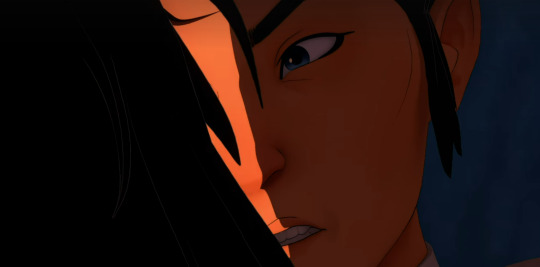

but THIS scene in the forge? warm colours. their laughter and their smiles that both equally genuine. the WAY taigen looks at mizu in that scene, staring first at her lips, her smile, then looking into her eyes. and you can see by the framing of the scene and the look on his face that he is, for the first time, seeing her eyes as something beautiful rather than off-putting or frightening.
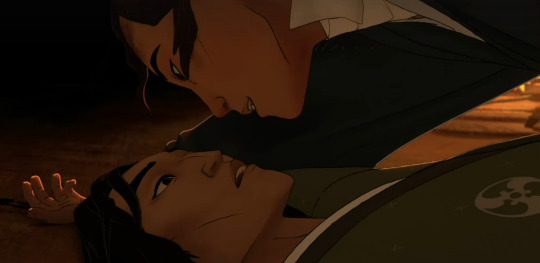
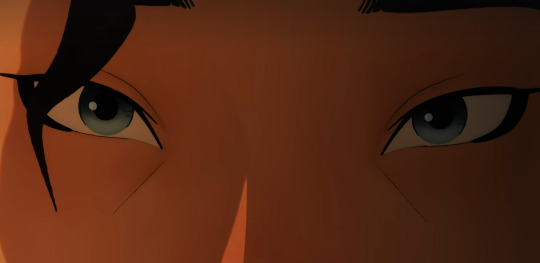
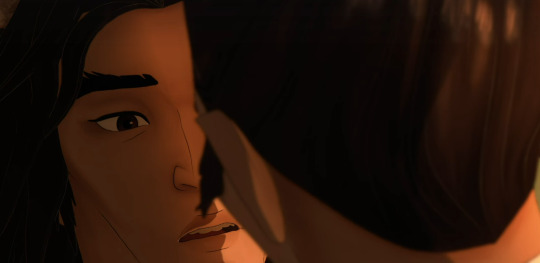
like before this point he's already come to not only respect mizu as a person and an equal but also admires her as an incredible swordsman and as someone who is kind and honourable* for having saved his life at the expense of her revenge quest. so as of the time of them tussling in the forge, taigen has already put aside his prejudices about mizu's blue eyes and no longer finds them as any cause for disgust. but in this scene he's not just indifferent about her eyes, but attracted too it.
and i'd also like to argue that his boner is not from the physical exertion or the act of wrestling itself, but from the intimacy of a playful spar, enjoying each other's easy company after having established a deep trust with each other (taigen endured torture for mizu and helped defend her from archers in the chasm while mizu saved his life from fowler's castle)
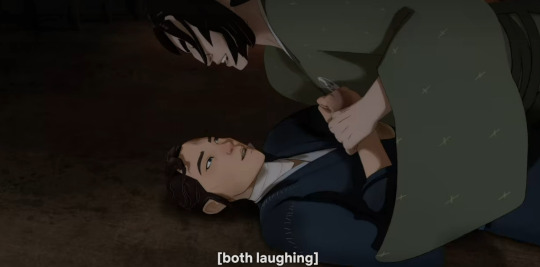
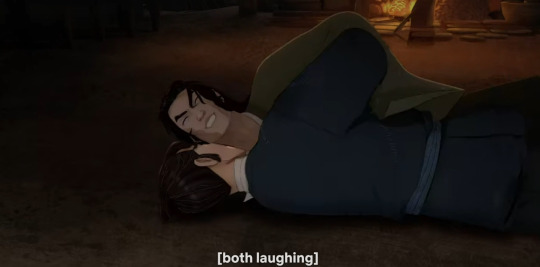
and all this while in the safety of mizu's childhood home while both of them are still recovering from near-death, amplifying their vulnerability with each other.

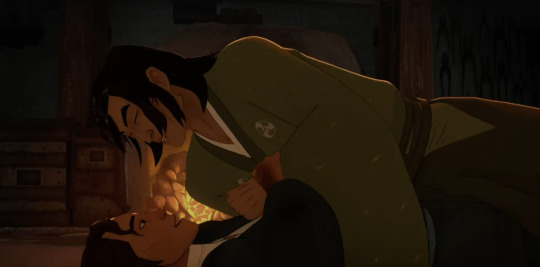

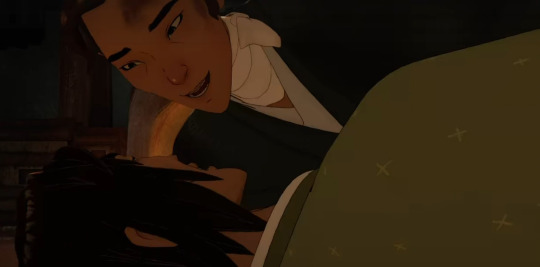
like when was the last time mizu cracked a genuine smile, let alone a laugh that's more than a little wry chuckle?? and for this to happen at such a low point in her life also speaks to the comfort this little friendly spar gives her.
because like, this is after she failed her mission to kill fowler. meanwhile her sword--the embodiment of her soul--is broken, and ringo who is her closest confidant is now angry at her and barely even looks at her. it just further lends to the inherent tenderness and intimacy in this scene. and i just. AHHHH i love them your honour....
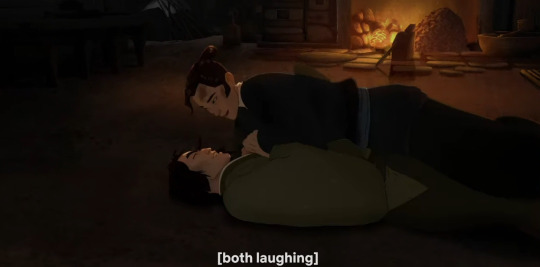
* ALSO as a side note about taigen believing mizu to be honourable: he later realises that this assumption turns out to be quite false when she reveals that she'd not only allowed akemi to be taken away against her will but also has said nothing about fowler's impending attack on edo.
also i find it very interesting that out of the two revelations, taigen is less angered by mizu letting akemi being married off (he sighs angrily and marches off saying he has to go to edo to find akemi), but much more angered by mizu's refusal to save the shogun and the shogunate as a whole.
this is more proof that taigen's central principles are firmly rooted in the bushido and the concept of honour that comes with that. it's why he lashes out at mizu. because he'd believed mizu to be honourable and righteous, but was proven wrong. that's not to say that taigen is in the right for calling mizu a demon, not by any means. but i just find it a very interesting part of his character and it relates to his relationship and perception of mizu
also while rewatching the episode i found this very funny they just lyin there in the cart like this 🧍🏽♂️🧍🏽♂️
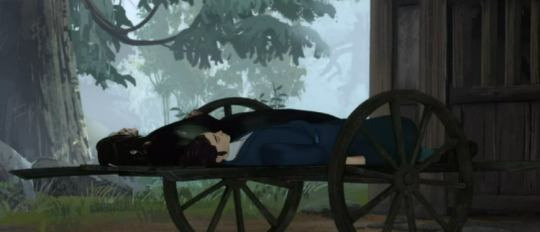
#blue eye samurai#mizu x taigen#taimizu#taizu#taigen blue eye samurai#mizu blue eye samurai#blue eye samurai meta#sorry yall but i prefer taimizu as the ship name so i'll probably just be using that from now on 🫡#also like.. the way im still recovering from covid while i have 2 deadlines back to back tomorrow and the day after#but im too busy hyperfixating on this show!!!!#if only i could channel all this energy into my actual literary studies papers that'd be great#but at the moment i be caring more about these fuckers than whatever william blake's got going on#jk i do still love william blake's poetry but my stupid ships take up way more space in my brain ykwim 🤒#anyway...#shut up haydar#meta dissertations.pdf#fandom.rtf
713 notes
·
View notes
Text
post-revenge arc, mizu and ringo living in a cabin near the town. since she is 'available' for a duel to the death, taigen challenges her again and mizu accepts as she promised. problem is, they can't settle on a date and keep delaying it for stupidest reasons .d
ringo is going to try a new soba recipe for dinner and of course he'll need both sides' opinions. what if mizu's opinion is biased? they can't trust taigen's pricky ass too.
mizu said if taigen will come here and linger everyday, he better be useful and talk less. so he collects woods, helps mizu for training, chops onions for ringo (which ended up being a mini-duel between him and mizu because ringo deserves the best chopped onions from the best samurai). but taigen is not stupid, he isn't going to fall for mizu's 'make taigen exhausted-slash him easily' plan. it won't be a fair fight. taigen has to rest and mizu should help him, she is responsible after all.
as the weather gets warmer, rumors of a big festival spread. ringo is so excited, talks non-stop about how much him and his master will have fun but taigen doesn't agree. he bets joining a festival with mizu is like carrying a heavy rock around while you are trying to enjoy your trip. mizu isn't obsessed with honour unlike taigen but she can't let that slide too. she will show him that she knows how to have fun, even more than him. they'll kill each other after the festival then.
(spoiler: they won't)
#taigen blue eye samurai#mizu blue eye samurai#taimizu#blue eye samurai#don't worry mizu saves her honour#taigen has never been enjoyed a festival more#they are stupid. their reasons are stupid#idk where this came from but- i wonder what mizu will do after her revenge so so so much and ik this is not likely to happen but-#let's just have fun while we can#i love them#why i got emotional out of nowhere#anyways. sillies
65 notes
·
View notes
Text
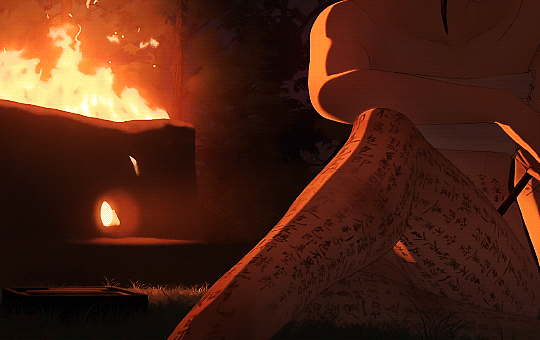


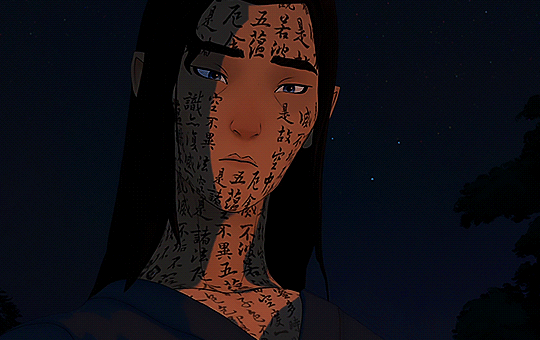


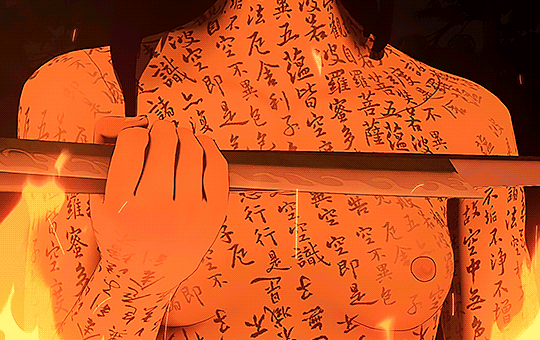



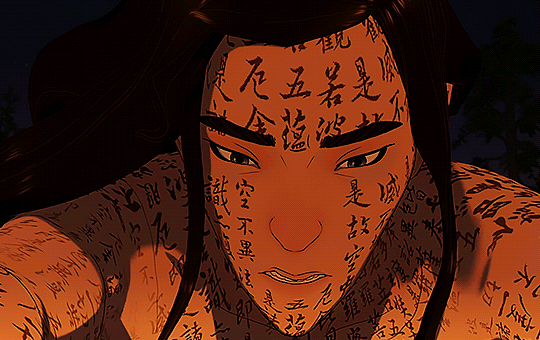
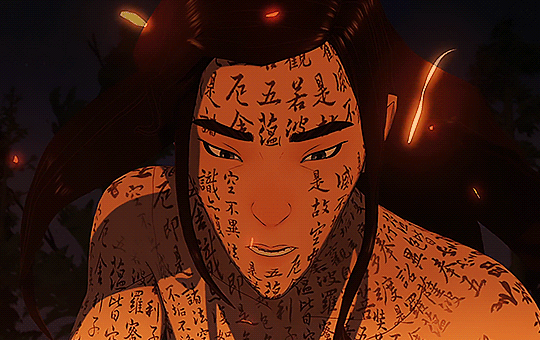

Blue Eye Samurai || Mizu
#blue eye samurai#bes#mizu#mizu bes#mizu blue eye samurai#japan#samurai#gif#gifs#dailytvgifs#dailytvedit#tvedit#animationsdaily#netflix#netflix series#ysigifs#putting the filter this time because there are too many ronin presenting n*pples#also has anyone tried to translate the kanjis in her body. i'd do it if i knew japanese but alas#anyway this is a close contender to my fav mizus in the show. right after cocky mizu in ep 4 and feisty wife mizu in ep 5#she just looks SO breathtaking in each scene........ i wanna smooch her 🥺🥺
62 notes
·
View notes
Text
mikio fumbled so hard it's actually tragic
#now me personally#i would not have fucked that up🗣🗣#cuz how do you have the hottest person alive kick your ass and get scared about it#THAT WAS HOT#anyway#i love taigen and mizu's dynamic#ik some of y'all don't like them but you just don't get it like me#blue eye samurai#mizu#mizu blue eye samurai#taigen#taigen blue eye samurai
92 notes
·
View notes
Text
(i hope this goes without saying that literally headcanon what you want: i'm criticizing the people who talk shit and can't accept other's people's headcanons. that's who i think is boring and annoying. there's complexity in Mizu's character in a lot of ways. I really cannot see how this headcanon is erasing any part of her identity. Please do feel free to correct me on this.)
I feel like ppl who hate on ppl who hc mizu as genderfluid are 1) boring, and 2) annoying. But most of all, they always use that dialogue between her n mikio, where she says she had to be one to enact her revenge.
Mizu is a person who is in an extremely sexist country, also being targeted for being mixed. In a way, being a boy was necessary. I also think that Mizu has found some comfort in being a man, in living like one. He prefers, in some ways, how a man is treated and is very comfortable being one not only out of necessity, but also because he likes it.
Now, just because he likes being a man, doesn't mean she also doesn't love being a woman. During the mikio arc, we all saw she was comfortable being a woman, she liked some parts of it even: being someone who deserves protection, who doesn't know how to throw a knife or fight for her life, who takes care of horses n cooks not just for herself; for her, being a woman means not doing what she has to as a man, which is fight for herself and enact revenge and live alone n all that.
At the same time, they're not totally a woman, nor a man. Because Mizu is not only about their gender, either man or woman: Mizu is a person who revels in both being masculine n feminine, but if they had the choice they would be both. They're part of both worlds (male n female) of edo Japan, and just as much as both worlds bring them immense amounts of pain, there's also a great deal of euphoria that they both give Mizu, and a mix of both is what gives them total peace.
I always think abt how effortlessly Mizu fought with mikio, since she was completely unrestrained and free there: both of her worlds were colliding and she fought in a way we dont rly see any other time in the series. Not only cuz she wasn't wearing her binder, but because all of her truth was revealed at the time, n she didn't have to hide any part of her then.
So yh anyways. Mizu genderfluid. And bisexual. And polyamorous.
#blue eye samurai#mizu blue eye samurai#mizu#hey look i posted a thing#come get yall headcanons#anyways yall can hc all u want#but when yall fight each other?? wtf bro. yall r boring n annoying#ppl who hc mizu as always being a woman are always the most annoying when we hc anything else#at least from what i've seen. also ppl who hc mizu as lesbian are very angry at ppl who hc her as anything else#again from what i've seen. u can hate a hc with all u want but. like. don't harass others bro#if ure gonna be mean and weird abt others hcs im gonna be weird to u back. or just block u tbh. theres no point#like stfu pls#sorry yall#but yh#if anything abt this hc erases mizu's character in anyway i rly dont see it. im rly confused. seriously
53 notes
·
View notes
Text
Blue Eye Samurai: regarding Mizu’s “plot armour” or her “ridiculously over-powered” abilities.
“Mizu is way too overpowered, it doesn’t make sense.”
I feel like a lot of people don’t realize just how much the mind over matter mentality plays a roll in Mizu’s “abilities”. Mizu isn’t the best because she’s physically the strongest, or had the best training, or the most experience, or whatever. Mizu is the best because she has single-minded focus and immense tenacity that borders on psychotic due to how intensely dedicated to revenge she has been for almost all of her life. All the years she spent training, all the time she spends taking out enemies, she is being driven by single minded focus and iron willed determination that never wavers. She has been sharpening and honing not just her body, but her mind, for exactly this. She has dedicated her entire life to her quest for vengeance, and in her own words, there is no room in it for anything else.
People also seem to be making a lot of assumptions about what kind of training and how much training Mizu has or has not had. As the audience, we’ve only been shown bits and pieces of Mizu’s past, which includes her experience learning martial arts. Asking shit like “how is she so good with a sword if she’s only self taught?” is like asking “how can she read and write if Master Eiji is blind?”. The answer is that Mizu has obviously learnt these things from more than one source, but documenting her entire education in detail doesn’t exactly serve a purpose to the narrative. We are explicitly shown in one of Mizu’s flashbacks that she’s been practicing with a wooden sparring sword since she was very young. It’s actually her child self that we see in that brief particular flashback. Not her teen/tween self, her child self. She’s also following the movements and instructions of an older man that is clearly a skilled samurai or warrior of some kind based on context (which y’all love to ignore). Besides, who else would want/need a sword from a master sword-maker besides an expert swordsman? How many skilled fighters from all over Japan have come to Master Eiji’s forge hoping for a blade, and wait with nothing better to do but train while their blade is being made? How many of them have divulged information about certain fighting styles (like Shindo-Ryu, which Mizu was familiar with despite never having been to the dojo before). Or practiced around her and with her? We are clearly shown through Mizu’s flashbacks that receiving training from a visiting client has not been unusual for her throughout her apprenticeship with Master Eiji, and her little spar with Blood Soaked Chiaki was no one time event. Yet Mizu is never given the benefit of the doubt by the audience, despite context clues indicating that she should be.
“Taigen has way more training in an actual dojo, so why is Mizu better?”
Whereas Taigen, while he was determined to become more than just a fisherman’s son and was driven to rise through the ranks of the Dojo and become a skilled samurai, did not have that same desire or determination to hone every part of himself to be the most deadly weapon he could possibly be, like Mizu did. Taigen believes in the samurai code of honor and upholds it in his own way (preventing him from learning how to “fight dirty” so to speak) and he also had a life outside of his training (he had a social life, he drank, he partied, he snuck around a lot to see Akemi presumably, etc). In fact, we actually never see Taigen practice, train, learn, hone his skills, or anything (to my recollection) throughout the whole season, until he’s bested by Mizu in combat. I’m assuming Taigen had to work quite hard for several years to become as good as he is, but I get the sense that ever since he has been regarded as a prodigy he has allowed himself to get cocky and maybe a bit too comfortable. He has always been the best and always thought himself to be the best, so he never needed to give 150% effort when he fought. In fact, as he got older and more practiced, and it became more and more apparent how much better he was than everyone else, he probably stopped giving his 110% and allowed himself to get a bit comfortable putting in 100% effort, and then eventually 80% effort (which is part of the reason why I think he’s so pissed he lost to Mizu in their first fight, because he knows he could have done better: been less cocky, been more tactical, more driven, etc).
We also never see Taigen meditate or mentally or physically prepare himself the way we do with Mizu. Mizu will pray before a major upcoming battle, not because she’s religious, but because she’s mentally, emotionally, and spiritually preparing herself. We even see Mizu submerge herself in very cold ocean water (during the winter mind you) as a ritual/practice of sorts that serves to center herself and prepare mentally and physically for what’s ahead when she feels herself getting “too emotional” or too stressed or unfocused or even just slightly off kilter. Mizu sacrifices every part of her life, so that she can be the deadliest version of herself possible. She has no social life. She has no friends, or significant others (Mikio aside). She has no other activities to participate in, because she’s been completely alienated and thus being anything but the best is not an option in her mind because she has no options. She tried married life. She had the best possible life that she could have had as a biracial woman in Edo era Japan. She did as she was told by her “mother”. She showed her true self to Mikio, just as he desired. Yet the blood and vengeance still caught up with her. She has no other options anymore. Pursuing revenge is the only thing she knows how to do, because every other avenue in life has been cut off from her. So she has to be single-mindedly focused on her vengeance, which means being as skilled and as dangerous as she can possibly be. She has no hobbies or jobs or responsibilities beyond sword-making (which allows her to become as familiar with the blade as possible) and training herself. If she has extra time, she uses it to practice, to train, to improve, to simply maintain peak performance. Such as when she was hacking through those trees in episode 2. Afterwards, we see Taigen attempt to replicate her training (by cutting down trees with his sword). Though even then, it was more about curiosity and trying to suss out Mizu so he could gauge her skill level, then it was about actually honing his own abilities (until episode 3 when he practices with Chiaki’s broken blade). Which does count as training in its own way (assessing your enemy), but my point still stands. Taigen does not have the same unwavering focus and force of will that Mizu does (partially because he does not actually want to kill Mizu, as we do see Taigen go cold blooded with focus when he kills Heiji Shindo, but those are whole other discussions).
“Mizu just has ridiculous plot armour, that’s the real reason she survives every encounter.”
I feel like people that think Mizu has ridiculous plot armour are just not at all familiar with the Samurai or Western/Cowboy sub-genres at all, or even action as an overarching genre on its own. I don’t believe I have ever engaged in a single piece of action media in which the protagonist didn’t have “plot armour” in some way. Basically half of all male protagonists from any and all modern western action movies ever, have been way too over-powered and been able to take a ridiculous amount of damage that should have killed them multiple times over. These action heroes (who in western media are almost always cis-het white men) have ridiculous plot armour in the most classic sense. Yet no one complains when it’s a white man. Only when it’s a queer-coded biracial woman of colour. Shocking.
In fact, you could argue that every main character in every fictional story ever told has plot armour to a certain degree, because having an entire narrative revolve around one character is inherently “unrealistic” and therefore the main character has plot armour, yes? No? Yeah, that’s what I thought. Oh, and on the topic of the samurai genre specifically (and many martial arts based action media) there are certain genre specific tropes that are nearly integral to the genre. One of the most prominent being the samurai/ronin/warrior/martial arts master that is “ridiculously over powered”. It’s literally part of the genre. In fact, the western/cowboy genre is quite similar to the classic samurai genre. Now, how many westerns have you watched in which Clint Eastwood or John Wayne shoot 5+ guys with one pistol before any of the guys they shoot even get a shot off? A lot I bet. Is that not the definition of “over-powered” and “unrealistic”? Or is it just a genre trope, or even perhaps, a genre staple? No one thinks Arthur Morgan (Red Dead Redemption 2) is over-powered. No one thinks that Joel (The Last of Us) is over-powered. In fact, when the TLOU show came out, people actually complained that Joel, the fifty-something year old man that has been living in a post apocalyptic wasteland for 20 years, was not badass or strong enough (he kills dozens of humans and super zombies and he’s legally a senior). So, who is the “judge” of what is and is not realistic in action media that borders on sci-fi/fantasy based on how “over-powered” the protagonists “realistically” are?
“It’s just weird that Mizu is so powerful when other characters within the story are not. It makes Mizu such a Mary Sue.”
Okay… so, with all that in mind, let’s circle back to where I started when referring to Mizu as someone driven by unwavering determination, and how that affects her “abilities”. That facet of her personality and motivation is nothing new when it comes to the action genre, especially for protagonists of revenge storylines. Think of Kill Bill or John Wick. Why does John or the Bride keep going and keep winning even when they are constantly getting injured and always fighting. Is it because they are simply that much better than everyone else? Yes and no. No, because they are not superheroes (technically), but also yes. Because their single minded determination and need for revenge drives them to push that much harder than anyone else on their skill level. They are the best, but they win against everyone else that is also “the best” because they want it more. They need it more. Mind over matter. They are willing to endure what others are not through sheer will and pure cold rage. Mizu, Beatrice Kiddo, John Wick, and so many more similar protagonists in action-revenge narratives don’t keep winning and keep getting back up no matter how inured they get because they are just “that much stronger and more talented than everyone else”. Yes, they are extremely skilled and would probably be one of the strongest and most deadly combatants/killers in their respective universes regardless… but their refined skill and raw talent and power are not the only reason they win. Their unwavering force of will, extreme determination, ice cold fury, and single-minded focus on revenge is what drive them to be that much tougher. Their tenacity is their superpower. They want to win more than their opponent does. They need to win, because this is their one and only goal in life as of now. Mizu (Blue Eye Samurai) Beatrice (Kill Bill), John (John Wick), they all share a philosophy in life when it comes to their revenge, which basically boils down to “Either I kill you, or I die trying. There is no middle ground, there is no negotiating, no other choice, no path of least resistance, no other goal or motivation. You will die, because I ain’t fucking dying until you do.”
Mizu doesn’t have plot armour and she’s not over-powered. She is an archetypical protagonist of the action-revenge narrative and the samurai/western genre as well. She arguably even has better reason to be completing the feats that she does than John Wick or The Bride, because the medium of Blue Eye Samurai is animation and not live action, and the genre borders on magical realism far more than Kill Bill or John Wick. Now, how many anime protagonists (probably almost all male) can you think of that are “ridiculously over-powered” especially compared to any live action counterparts, but no one complains about it? Why does no one complain about it (aside from misogyny)? Because the medium of animation inherently has different “rules”, expectations, and set standards for suspension of disbelief, than the medium of live action film or television. For example, is it ridiculous and unrealistic when you’re watching a Looney Tunes cartoon and Bugs Bunny’s legs pinwheel in super-speed for 3 seconds straight before he starts running, or when he runs off a ledge and gravity just lets him hang there for a sec so he can look straight at the camera before he falls? No, it’s not “unrealistic” or emersion breaking, not even a little, but why? Is it because any of those things seem even remotely probable or “realistic”? Of course not! It’s perfectly acceptable because the medium, genre, target audience, atmosphere, art/animation style, narrative choice, storytelling style, and more, have all established that Bugs Bunny defying physics is normal in Looney Tunes, and therefore not a “plot-hole” or “unrealistic”. In fact, if Bugs Bunny or Tom and Jerry didn’t defy physics in ridiculous ways all the time, then it feels far stranger and off-beat than if they did. Same goes for pretty much all action anime. If the characters in those stories were strictly limited to what is 100% humanly possible in real life, most of those animes wouldn’t even have storylines anymore. They’d be turned into completely different content that may be unrecognizable from the original source material. Or wouldn’t even have any material anymore because all the characters would be dead after their first fight scene. So why is Blue Eye Samurai being held to a different standard?
Now, do y’all get it yet?
#long post#mizu#blue eye samurai#👏 genre and👏 medium matter👏#so does author intention >>>#if a story is telling a narrative that you personally don’t like but it is succeeding at what it set out to do that does not make it bad!!!#so sick of white boys on the internet calling any physically capable or martially skilled female character a Mary Sue#and it almost always boils down just to gender#a female character could be ridiculously overpowered but so long as there is a male protagonist that is even more overpowered they don’t ga#but as soon as there is a female protagonist with any kind of proficiency a male character in the story doesn’t have all hell breaks loose#if i hear one more man so much as utter the words ‘Mary Sue’ in my vicinity ever again i will be resorting to Mizu style conflict resolutio#men never learnt what the term ‘Mary Sue’ actually means and if you don’t know what something means then either research it or stfu#it’s such loser behaviour that shows such a pathetic measly capacity for any kind of critical thinking or reasoning much less media analysi#anyway rant over#this was sitting in my drafts#blue eye samurai analysis#mizu blue eye samurai#taigen blue eye samurai#taigen#overpowered#plot armor#media analysis#mizu bes#bes taigen#netflix bes#feminist critique#bes#blue eye samurai meta#reading comprehension#rant
21 notes
·
View notes
Text
i keep seeing modern Mizu this modern Mizu that and I just
I don’t know how to write this in an articulate, thoughtful way that encapsulates what I truly mean but, I'm frantically craving to write modern Mizu too but in a way that's just. Really fucked up. Like a really fucked up toxic relationship between her and some Lady.
Like rage filled screaming/breaking up over and over again/Mizu furiously chasing her around trying to pull her back in every time she fucks up even though she doesn't care (she does). Just pure toxic insanity that SOMEHOW in the end can be worked out because the love is so fierce and feverish and deep and real
#I WANT ALL THE TOXIC DRAMA!!!!#I wanna find a way for her to be in a modern times setting but still be all fucked up over her father and have extreme issues that bleed#through her relationships!! Y'all love reader x Mizu so much let me just. Do it and fuck y'all up bc if you think a modern but still ic Miz#would not absolutely make y'all suffer you are wrong. Also taking the opportunity to admit that I'm also SO in love with#That Loser Mizu au going around Tumblr lol.#Anyway I'm back and need to write Things#mizu blue eye samurai#blue eye samurai
23 notes
·
View notes
Text
OK so we can all agree Taigen is canonically bisexual right
#also i headcanon mizu as on the ace spectrum but that's not really proven it's just me being ace and seeing part of myself in her#anyway#blue eye samurai#taigen
22 notes
·
View notes
Text
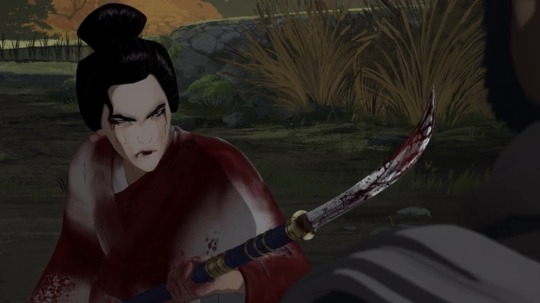
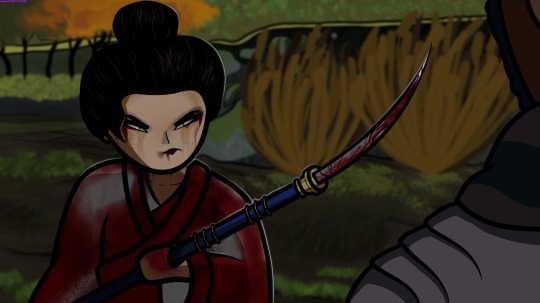
a bride blighted by blood becomes a beast
#Blue Eye Samurai#6#Hi hello everyone so episode 5. Messed Me Up#As it did with everyone I think#It was so dang beautiful and expertly crafted and thought out like come on#The angst of like Mizu getting stabbed in their stories (stop hurting themmmmm)#The puppet show#Seeing their mom and meeting Mikio#The tenderness of Mizu and Mikio#Their SPAR WAS SO BADASS#MIZU GETTING OUT FROM UNDER THE DOOR AND TRANSFORMING THEIR SWORD#THEM TRYING TO PLEASE MIKIO ONE LAST TIME AND THEN FIGHTING THE MEN GETTING BLOOD ALL OVER THEIR WHITE KIMONO AND SMUDGING THE MAKEUP#HOW IT ALL ENDED!?!?#LIKE THIS SERIES DESERVES 700 EMMYS AND OSCARS FOR THIS EPISODE ALONE#I LOVE IT SO MUCH#GAHHHHHHHHH#anyways take this art I couldn’t resist smudgy makeup and blood-soaked kimono#it actually turned out so cool what the heck their face looks real#Just go watch Blue Eye Samurai if you can like for this episode alone#💙
20 notes
·
View notes
Text
We all already know Mizu and Akemi are narrative foils. But you know what? Lemme just say it, here's what I think:
Taigen and Mikio are foils.
Not necessarily to each other as individuals in the way that Mizu and Akemi juxtapose each other, but mostly in the contrast between their relationships with Mizu.
I've covered specific parallels between Taigen and Mikio in other posts I wrote; but as the number of parallels I'm noticing between them keeps piling up, I'm compelled to just compile them all in one post. So! This is, thus, the post in question.
First of all, let's look at their similarities.
1. Their status in society is the same. They are both samurai who lost their honour and have dreams of reclaiming it.
2. They are also both diligent as they strive to achieve this goal, they both care deeply about their work, but here as they begin to contrast, as the work in question and way they go about their goals is different:
For Mikio, his work is in taming and rearing horses; in order to prove himself, he must tame Kai—a willful and strong horse—and present it to his lord.
For Taigen, his work is in sword fighting and martial arts; in order to prove himself, he must kill Mizu—a willful and strong swordsman—and present her dead body to his lord.
In the parallel above, not only are Taigen and Mikio contrasting each other, but Mizu and Kai are placed in comparison as well. And of course, Kai is Mizu's horse, and represents her. Which is why, when later, Mikio sells Kai off, it represents the way he is tossing Mizu (and their relationship) aside.
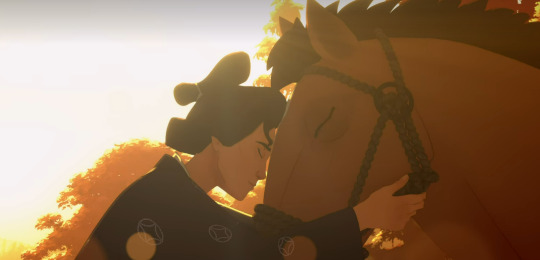
From there, the rest of the details of their character begin to contrast and juxtapose each other more clearly. So let's look at those differences, shall we?
Their backstory:
Mikio was a great samurai who was banished.
A somebody to a nobody.
Taigen was a fisherman’s son who rose to the top.
A nobody to a somebody.
2. The first time we meet them on-screen:
Mikio is an adult. An older man. Mizu's superior in age. He is Mizu's to-be husband. A love interest.
Taigen is a child. A young boy. Mizu's peer in age. He is Mizu's bully. An antagonist.

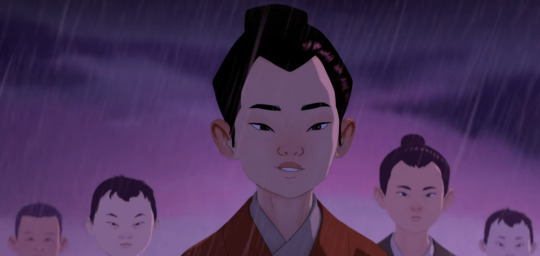
3. Their maturity and growth:
Mikio is mature, but stuck in his ways.
Taigen is immature, but capable of changing and learning.
4. Their overall attitude:
Mikio is generally relaxed, easy-going and unfussy.
Taigen is uptight, irritable and severe.
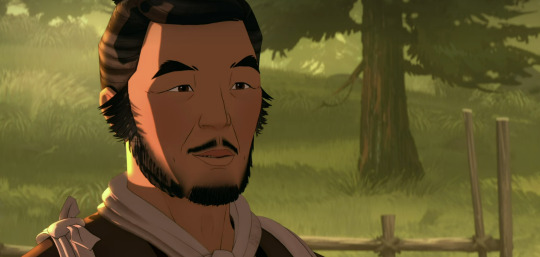
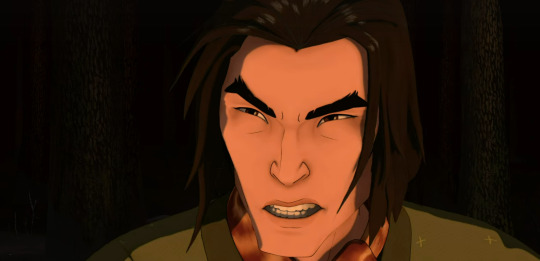
5. How they talk to and conduct themselves around Mizu:
Mikio is aloof, soft-spoken, and serious.
Taigen is obnoxious, brash, and sarcastic.
Mikio is quiet, speaking only when spoken to, even when Mizu turns to smile at him and shows openness to be near him.
Taigen is loud, talking while others are silent, even when Mizu turns from him and shows no interest in conversing with him.

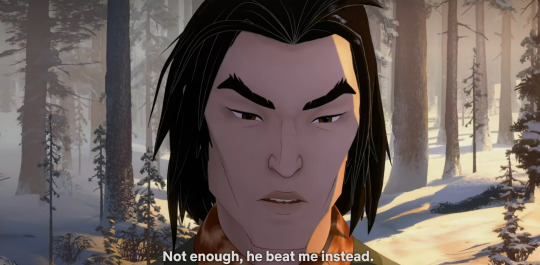
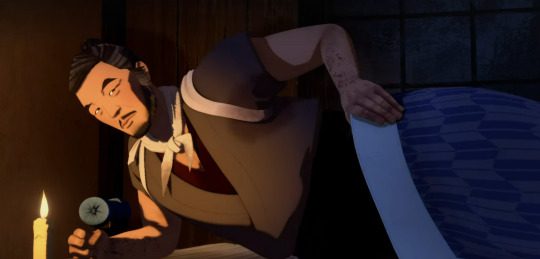

Mikio doesn't show much of who he is to Mizu throughout their marriage, despite their growing affection.
Taigen openly shares his traumas and life story to Mizu during their brief alliance, despite their mutual antagonism.
6. Their external vs internal selves:
Mikio is calm, gentle, and considerate on the outside.
Taigen is hot-headed, rude, and selfish on the outside.
Mikio is cowardly and deceitful on the inside.
Taigen is brave and loyal to a fault on the inside.
Mikio tells Mizu that he wants to know and see all of her.
But he scorns and betrays her, the woman he loves.
Taigen tells Mizu that he wants to duel and kill him.
But he endures torture to not betray him, the man he hates.
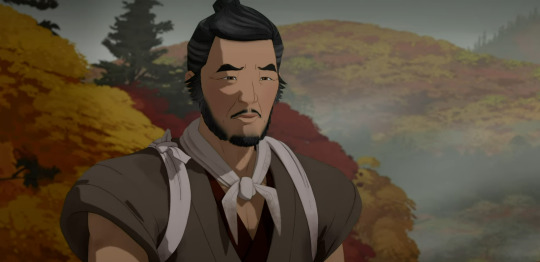
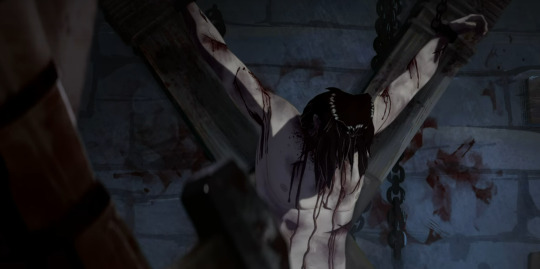


9. Their hair, a symbol of their honour:
Mikio's topknot is untied by Mizu during their spar.
This humiliation occurs in private, the two of them alone in a rural location where no one can see them.
Taigen's topknot is cut off by Mizu during their duel.
This humiliation occurs in public, the two of them being watched by many others in the Shindo Dojo.
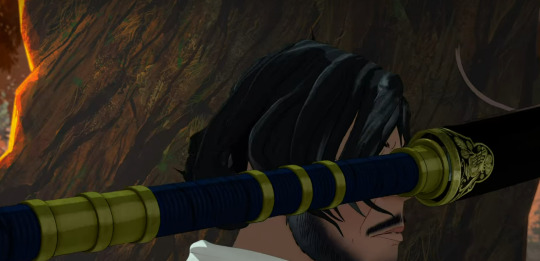
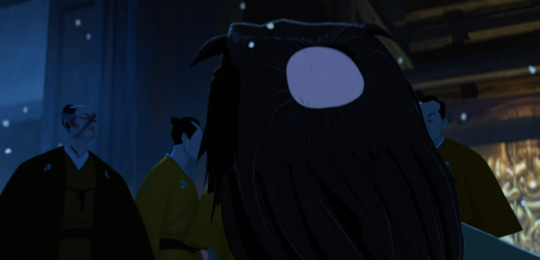
10. Their power dynamic with Mizu:
Mikio believes he is Mizu's mentor.
He teaches her to throw knives, how to ride and care for horses, and about the tactical benefits of using a naginata.
Taigen believes he is Mizu's equal.
He views Mizu as a samurai like himself who received all the same teachings he did, and who possesses the same values.
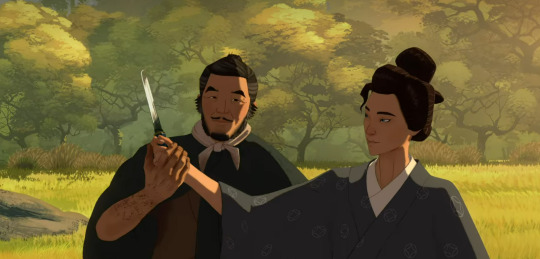
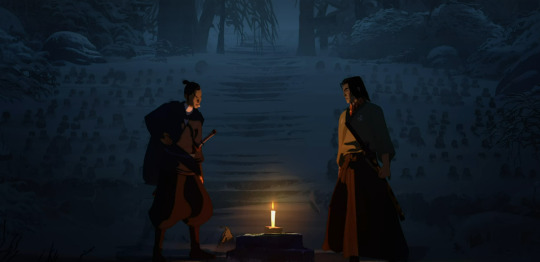
11. Their perceptions of Mizu:
Mikio sees Mizu's feminine side first.
He sees her as sweet and gentle, but also clumsy and incompetent.
Taigen sees Mizu's masculine side first.
He sees her as terrifying and deadly, but also strong and skilled.
12. The way they approach sparring with Mizu:
Mikio only spars with Mizu once. As the fight progresses and she is beating him, he tries to put a stop to it. When she teases/provokes him, he starts taking the fight personally and seriously, finding no enjoyment in it.
Taigen spars and brawls with Mizu all the time. No matter how many times Mizu beats him, he doesn't back down. When Mizu challenges him with a chopstick, he is eager to compete with her and gladly rises up to the challenge.
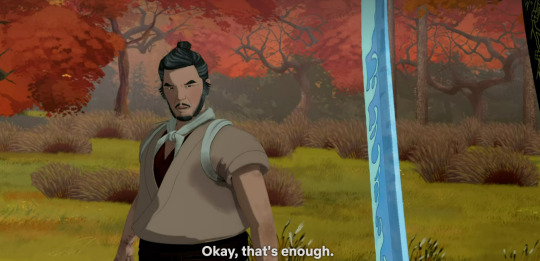
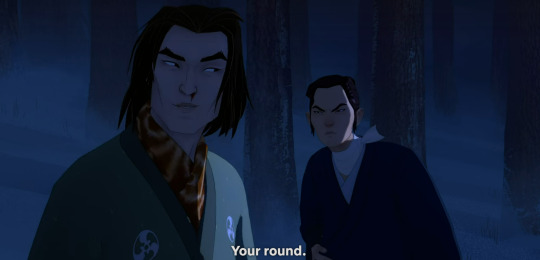
Mikio and Mizu's one and only spar is a friendly match; Mizu is smiling and having fun while he grows increasingly frustrated.
Taigen and Mizu's last-seen spar is a playful wrestling match; both him and Mizu are having fun and laughing.

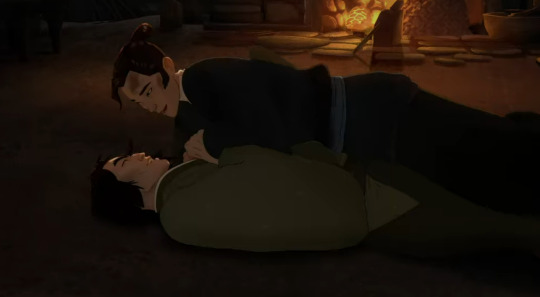
Mikio cannot deal with Mizu being better than him, so he scorns her and walks off, avoiding her thereafter.
When Taigen cannot deal with Mizu being better than him, he follows her to observe her moves and continues training in hopes to eventually beat her.
After being bested by Mizu once, Mikio leaves her and sells the horse he'd previously gifted to her.
After many times losing to Mizu and fighting alongside her, Taigen commends her and admits she is better than him.
13. When Mizu pins them down in a friendly spar:
Mikio sees Mizu's whole face objectively.
Taigen stares at Mizu's mouth and eyes.
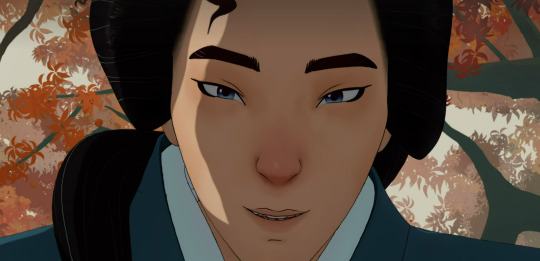

Mikio gets angry when she kisses him, throwing her off of him and snapping at her, calling her a monster.
Taigen gets aroused, apologising, so she pulls herself off of him.
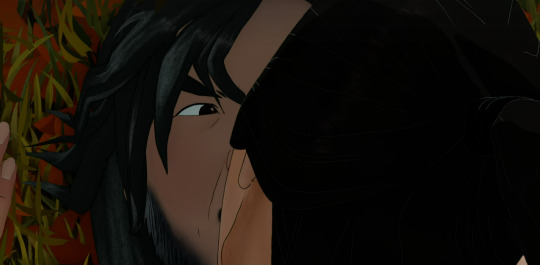
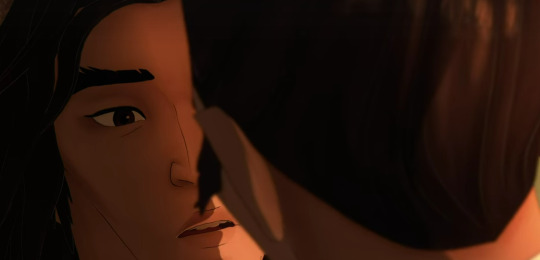
14. Mizu's blue meteorite sword is a reflection of her soul. She believes most are undeserving to face it, let alone hold it. And on that note:
Mikio is the first person (chronologically) that Mizu fights against using her sword.
Taigen is the first person (we see on-screen) that Mizu fights against with her sword.
Mikio is the first person (chronologically) to ever hold her sword, as she passes it to him, letting him wield it.
Taigen is the first person (we see on-screen) to ever hold her sword, as she passes out, and he picks it up and carries it for her.
15. Then, last but not least, in Fowler's fortress, when she is drugged and in pain, she hears Ringo's voice in the dungeon. She then follows it to an open cell:
Mizu first sees Mikio as a hallucination, the sight of him haunting her and causing her to lose her grip on reality. Her eyes glow a surreal blue to represent this.
Her Mama appears then and says Mizu's name accusingly.

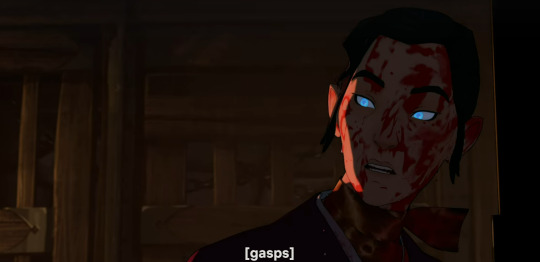
Mizu then sees Taigen, but he is real, the sight of him a relief and grounding her back to reality. Her eyes return to their normal blue colour to represent this.
Taigen looks at Mizu weakly and says her name softly.
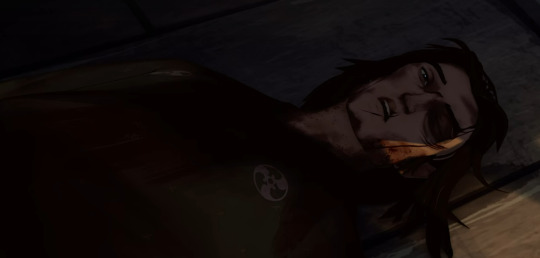

Then, later, when facing Fowler, her revenge awaiting her, she instead chooses to follow her conscience (represented by Ringo's voice in her mind), putting aside her vengeance for a time, in order to save Taigen.
So that's basically all the ones I've noticed so far, but even then, I feel there's already so much that forms a contrast between these two.
What makes it especially incredible about these juxtapositions is that Mikio was Mizu's husband, the man she had fallen in love with, the one person she had ever been intimate with, the man who made her begin to accept herself, to put down her desire for vengeance and instead live a life of peace and happiness.
So for Taigen to have so many parallels with him... Do you see what I'm saying here!
Not to mention that Mizu clearly already has some burgeoning attraction to him, as indicated by how she thinks of him when asked about her desires. And Taigen clearly has shown interest as well (see: him getting a boner after their spar, him holding her hand and telling her, "We're not done yet.").
And on the topic of speculating future possibilities of this relationship, this post by @stromblessed has pointed out yet another parallel between Taigen and Mikio:
Mizu promises Taigen to meet him for their duel in autumn.
Mizu fell in love with Mikio and duelled him during autumn.
With all that said, I do believe Mizu and Taigen's relationship is definitely hurtling towards something. But whether they will actually end up together in a sustainable relationship and have a happily ever after? Well, that is a whole other story; we'll just have to wait and see.
#blue eye samurai#mizu x taigen#taigen x mizu#taimizu#taigen blue eye samurai#blue eye samurai meta#hope yall enjoy my thesis on virgin mikio vs chad taigen#this was written last night when i shouldve been writing the new chapter for my taimizu fic that i promised i would work on....whoopsies...#i will get to it eventually but i just have to get a firmer grip on characterisation before i can delve further into it yk#on that note. i kiiinda regret posting the fic on a whim!#my last longfic was written better because i had the whole thing complete and could go back and edit/polish/revise before posting#so it came out much more coherent and consistent ykwim?#this fic might suffer a bit for this reason 🤒#but its fine i have to remind myself im just doing it for funsies#anyway here have another long ass meta post from yours truly#meta dissertations.pdf#shut up haydar#fandom.rtf
439 notes
·
View notes
Text
TIL the first female geisha did not appear until 1751. Any geisha before that time were male performers.
So, uh, yeah they really were slim pickings for the women of BES. Wife or whore were indeed the only options.
#historically accurate smut#i was wondering if madame kaji would want to run an okiya instead of a brothel#but nope! not even an option at this point in history#thats fine i needed a good reason to stick to brothels as a common setting for shenanigans#i just didnt wanna feel like id be regressing madame kaji’s character too much#anyway this one can be the ~fancy brothel~ where madame kaji can run this business with her girls best interest in mind#able to pick and choose a discerning clientele#serve more than just sex#with strong financial backing from akemi herself#cause madame kaji and her girls are her ear to the ground#plus akemi and takayoshi like to sneak off to the madame’s house quite often#anyway lemme go back to notes and outline instead of putting it all hear lmao#maybe write some more of my mizu x massage one shot#blue eye samurai
14 notes
·
View notes
Text
5x5 grid of babygirls featured in media I consumed in 2023

#chase post#im not tagging all this lmao#just cataloguing my interests#I did a lot less free media consumption in general cause I went back to school this year#but id say 2023 was a pretty fantastic year for games overall#not that I actually played the most of the big releases I just caught up on indies & cyberpunk lmfao#some other things worth noting#played all max payne but only finished alan wake 1 so far#descole is here because specifically played the prequel layton games this year & the original trilogy last year#tulin is here because I dont really care for anyone else from totk#castti is still my most beloved and octo2 is still my goty#yuri lowell is a very close 2nd#puss in boots was my favorite movie#i also watched blue eyes samurai and considered putting mizu on here but relented when I heard that co creator was a zionist#anyway that's the last personal post of the 2023 from me#happy soon-to-be new year everybody
8 notes
·
View notes
Text
no rizz just constantly "jokingly" tell him how fucking hot he is
#it's literally like: 'wah Mizu is soo attractive to me... btw have i ever told you I've always thought he looks kinda like you?'#'you'd look so sexy in that white shirt haha'#which btw it's the kind of stuff I've told him since forever. i '''jokingly''' had a List of Reasons Why You're Sexy lol#(which includes things like 'ive seen you repair a faucet with your bare hands' btw. like woah)#i just?? never realised?? how hard i was crushing?? because i was too obsessed w my former best friend/main crush#another friend of mine told me this is a good sign. i think he's right#still i am panicking over this crush. over liking people in general atm#i want to go to therapy tbh#how did i end up talking therapy?? i was talking about the boy i like??#anyways. thanks to whoever reads this & sorry if I'm oversharing I guess#I just have to retrieve several months of unrealised simping i guess hahaha#personal#cal has a crush and makes it everyone's problem once again
2 notes
·
View notes
Text
This is a Blue Eye Samurai fan blog now sorry not sorry I'm obsessed
#i think if my life had gone differently and i hadnt realized i were trans i would have entirely hyperfixated on Mizu#like even just as things are now Mizu is so.... i see me in you and you in me holy fuck#but i can just *imagine* how pre-realization me wouldve seen her#anyways this is probably my favorite piece of media right next to white fang#which. we dont have to analyze. we definitely could. i definitely will be and already have been.#i have a narrative type i guess#we dont gotta look at what that means about me#anyways i need to try to sleep#idle rambling
4 notes
·
View notes